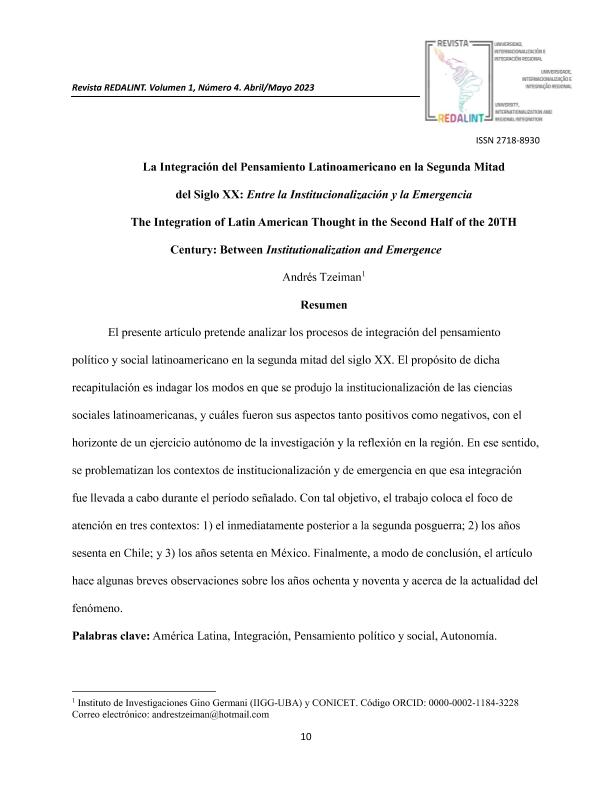Mostrar el registro sencillo del ítem
dc.contributor.author
Tzeiman, Andrés

dc.date.available
2024-03-19T16:06:21Z
dc.date.issued
2023-04
dc.identifier.citation
Tzeiman, Andrés; La integración del pensamiento latinoamericano en la segunda mitad del siglo XX: Entre la institucionalización y la emergencia; Universidad Nacional del Comahue; REDALINT; 1; 4; 4-2023; 10-46
dc.identifier.uri
http://hdl.handle.net/11336/230939
dc.description.abstract
El presente artículo pretende analizar los procesos de integración del pensamiento político y social latinoamericano en la segunda mitad del siglo XX. El propósito de dicha recapitulación es indagar los modos en que se produjo la institucionalización de las ciencias sociales latinoamericanas, y cuáles fueron sus aspectos tanto positivos como negativos, con el horizonte de un ejercicio autónomo de la investigación y la reflexión en la región. En ese sentido, se problematizan los contextos de institucionalización y de emergencia en que esa integración fue llevada a cabo durante el período señalado. Con tal objetivo, el trabajo coloca el foco de atención en tres contextos: 1) el inmediatamente posterior a la segunda posguerra; 2) los años sesenta en Chile; y 3) los años setenta en México. Finalmente, a modo de conclusión, el artículo hace algunas breves observaciones sobre los años ochenta y noventa y acerca de la actualidad del fenómeno.
dc.description.abstract
This article aims to analyze the integration processes of Latin American political and social thought in the second half of the 20th century. The purpose of this recapitulation is to investigate the ways in which the institutionalization of the Latin American social sciences occurred, and what were its positive and negative aspects, with the horizon of an autonomous exercise of research and reflection in the region. In this sense, the contexts of institutionalization and emergency in which this integration was carried out during the indicated period are problematized. With this objective, the work places the focus of attention in three contexts: 1) immediately after the Second World War; 2) the sixties in Chile; and 3) the seventies in Mexico. Finally, as conclusion, the article makes some brief comments about the eighties and nineties and about the current situation of the phenomenon.
dc.format
application/pdf
dc.language.iso
spa
dc.publisher
Universidad Nacional del Comahue
dc.rights
info:eu-repo/semantics/openAccess
dc.rights.uri
https://creativecommons.org/licenses/by-nc-sa/2.5/ar/
dc.subject
Ciencias sociales
dc.subject
América Latina
dc.subject
Institucionalización
dc.subject
Integración
dc.subject.classification
Ciencia Política

dc.subject.classification
Ciencia Política

dc.subject.classification
CIENCIAS SOCIALES

dc.title
La integración del pensamiento latinoamericano en la segunda mitad del siglo XX: Entre la institucionalización y la emergencia
dc.title
The Integration of Latin American Thought in the Second Half of the 20TH Century: Between Institutionalization and Emergence
dc.type
info:eu-repo/semantics/article
dc.type
info:ar-repo/semantics/artículo
dc.type
info:eu-repo/semantics/publishedVersion
dc.date.updated
2024-03-18T11:23:36Z
dc.identifier.eissn
2718-8930
dc.journal.volume
1
dc.journal.number
4
dc.journal.pagination
10-46
dc.journal.pais
Argentina

dc.journal.ciudad
Neuquén
dc.description.fil
Fil: Tzeiman, Andrés. Universidad Nacional de General Sarmiento. Instituto del Desarrollo Humano; Argentina. Consejo Nacional de Investigaciones Científicas y Técnicas; Argentina
dc.journal.title
REDALINT
dc.relation.alternativeid
info:eu-repo/semantics/altIdentifier/url/https://revele.uncoma.edu.ar/index.php/redalint/article/view/4834
Archivos asociados
